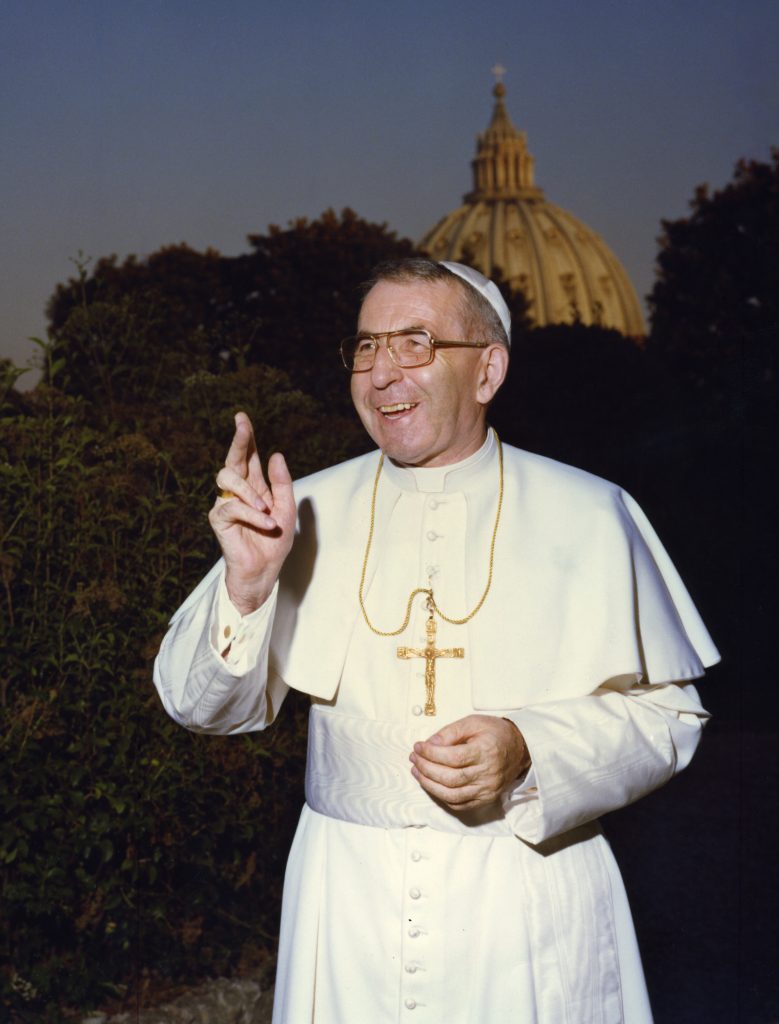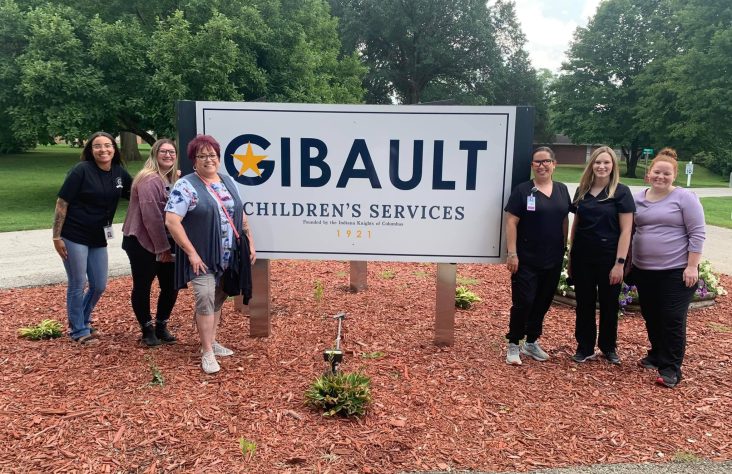November 18, 2017 // World News
News Briefs

Pope John Paul I, known as the smiling pope, is pictured at the Vatican in 1978. Pope Francis has advanced the sainthood cause of Pope John Paul I with a decree recognizing his heroic virtues. (CNS photo/L’Osservatore Romano)
Peace, dialogue held hostage by nuclear weapons threat, pope says
VATICAN CITY (CNS) — The existence of nuclear weapons creates a false sense of security that holds international relations hostage and stifles peaceful coexistence, Pope Francis said. “The threat of their use as well as their very possession is to be firmly condemned,” the pope told participants at a conference on nuclear disarmament hosted by the Vatican. For years, popes and Catholic leaders had said the policy of nuclear deterrence could be morally acceptable as long as real work was underway on a complete ban of the weapons. In condemning possession of the weapons, Pope Francis seemed to indicate that deterrence is no longer acceptable. Nuclear weapons “exist in the service of a mentality of fear that affects not only the parties in conflict but the entire human race,” he said Nov. 10. The conference, sponsored by the Vatican Dicastery for Promoting Integral Human Development, brought together 11 Nobel laureates, top officials from the United Nations and NATO, diplomats from around the world and experts in nuclear weapons and the disarmament process. They were joined by scholars, activists and representatives of bishops’ conferences, including Stephen Colecchi, director of the U.S. bishops’ Office of International Justice and Peace.
Lebanese Catholic prelates urge world leaders to stop Mideast wars
BEIRUT (CNS) — Catholic leaders in Lebanon urged the international community to stop wars and bring peace to the Middle East, and they said Cardinal Bechara Rai, Maronite patriarch, would carry that message to Saudi Arabia Nov. 13. At the end of the Nov. 6-10 session of the Catholic Council of the Patriarchs and Bishops of Lebanon, the prelates said their pain “is the continuation of wars in the countries of the Middle East, particularly in Syria, Iraq, Palestine and Yemen, which have shaken the stability and peace and caused the programmed demolition and the ravages and misfortunes of innocent citizens.” Their meeting followed the Nov. 4 resignation of Lebanese Prime Minister Saad Hariri, announced from Saudi Arabia. Before that announcement, Cardinal Rai was scheduled to visit Saudi Arabia at the invitation of King Salman. It will be the first time a cardinal officially visits Saudi Arabia and the first visit of an Eastern patriarch to the kingdom since Greek Orthodox Patriarch Elias IV of Antioch in 1975.
Survey takes pulse of campus ministers, students with eye to betterment
WASHINGTON (CNS) — A survey of more than 4,000 Catholic campus ministers and students at U.S. colleges, commissioned by the U.S. bishops’ Secretariat of Catholic Education, showed that both the ministers and the students generally like what’s happening in their campus ministry setting. At the same time, campus ministers allude to areas that can be improved, while students acknowledge areas in faith and life where they struggle. The survey, conducted by Vinea Research, was done to help identify how to strengthen campus ministry education and formation programs as well as “renew a national vision of campus ministry as a community of faith, evangelization and discipleship,” according to Vinea’s Hans Plate. “For most faith-related activities, campus ministers feel they are receiving effective formation,” the survey results said. “Campus ministers feel better prepared for relational vs. organizational-related activities.” Campus ministers feel they excel in accompanying people on their spiritual journey, facilitating an encounter with Jesus, providing effective pastoral care, discipling others in Christian living, discerning the needs of the campus community, and calling forth and coordinating its gifts. They also said familiarity with other religious traditions, creating and managing budgets, navigating diocesan and other institutional structures are lower priorities that could benefit from additional training.
Couples need help forming, following their consciences, pope says
VATICAN CITY (CNS) — Marriage and family life are blessings for individuals and for society, but both are filled with difficult choices that Catholic couples must be helped to face prayerfully and in the light of their consciences, Pope Francis said. Unfortunately, too many people today confuse a rightly formed conscience with personal preferences dominated by selfishness, the pope said in a video message to an Italian meeting on “Amoris Laetitia,” his exhortation on the family. “The contemporary world risks confusing the primacy of conscience, which is always to be respected, with the exclusive autonomy of the individual” even when the individual’s decisions impact his or her marriage and family life, the pope said. Repeating a remark he had made to the Pontifical Academy for Life, Pope Francis said, “There are those who even speak of ‘egolatry,’ that is, the true worship of the ego on whose altar everything, including the dearest affections, are sacrificed.” Confusing conscience with selfishness “is not harmless,” the pope said. “This is a ‘pollution’ that corrodes souls and confounds minds and hearts, producing false illusions.”
Civility must guide debate on social challenges, USCCB president says
BALTIMORE (CNS) — Acknowledging wide divisions in the country over issues such as health care, immigration reform, taxes and abortion, the president of the U.S. Conference of Catholic Bishops called for civility to return to the public debate. Contemporary challenges are great, but that they can be addressed without anger and with love Cardinal Daniel N. DiNardo of Galveston-Houston said in his first address as USCCB president during the bishops’ fall general assembly. “We are facing a time that seems more divided than ever,” Cardinal DiNardo said. “Divisions over health care, conscience protections, immigration and refugees, abortion, physician-assisted suicide, gender ideologies, the meaning of marriage and all the other headlines continue to be hotly debated. But our role continues to be witnessing the Gospel.” He explained that the National Catholic War Council, created by the U.S. bishops in 1917 in the response to the world refugee crisis that emerged from World War I and the forerunner to the USCCB, was formed to address great national and international needs at a time not unlike today.
The best news. Delivered to your inbox.
Subscribe to our mailing list today.






